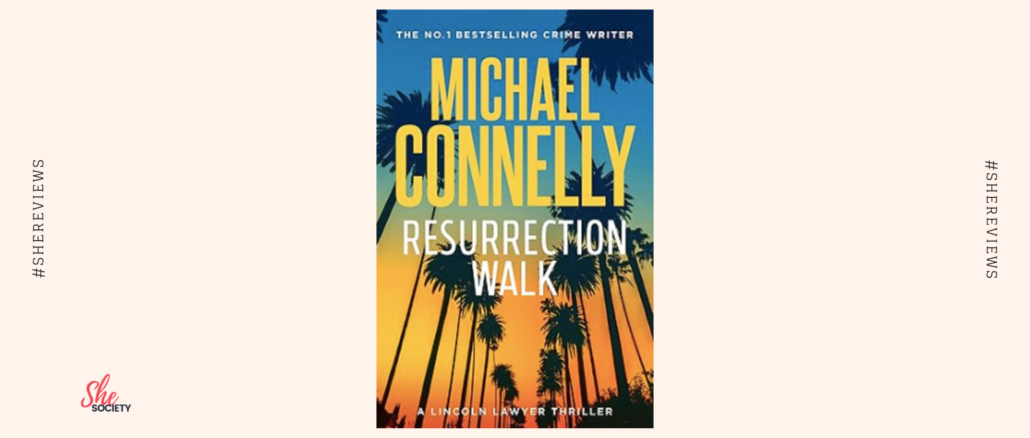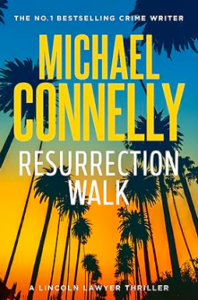
Undoubtedly, there are those languishing in our jails who stridently profess their innocence. The question is, are these individuals maligned, misjudged and victims of unforseeable miscarriages of justice? Or are they simply cunning manipulators out to deceive and dupe their legal team and society?
Such timely ponderances are expertly examined in phenomenal American crime writer, Michael Connelly’s, latest thriller, Resurrection Walk.
Mickey Haller, a defense attorney, is based in the American murky (crime-wise) metropolis of Los Angeles. In the novel’s initial pages, we become aware that Haller surely must be one of the ‘good guys’ (mustn’t he?) in the legal fraternity. He has just got Jorge Ochoa out of Corcoran State Prison, a place where normally “You checked in but you never checked out”. Jorge has been found to be innocent of a murder he never actually committed (Jorge has been incarcerated for fourteen long and torturous years). “His life sentence had been vacated after a court finding of actual innocence. He was rising up, coming back to the land of the living”. And it is all thanks to Haller’s work.
As Haller reflects to himself, “I had resurrected this man from the dead. And with that came a fulfillment I had never known in the practice of law or life”.
Harry Bosch, a retired LAPD Detective, is now working as an investigator, and is Haller’s half-brother.
Haller and Bosch, working together, receive a heartfelt letter from a Lucinda Sanz, a young woman convicted and serving her sentence in Chino Prison, for killing her ex-husband, by shooting him on the front lawn of her house when Lucinda was thirty-three. Lucinda insists to the brothers that she is innocent.
Haller and Bosch meet with Lucinda and agree to pursue her case, to see if there is any merit in her claims.
Bosch drives Haller around ‘the traps’ in a classy Lincoln, and they certainly cover many miles together, as they converse about legal matters. We are told that Haller “had hired him (Bosch) so that he could get private health insurance and be in the clinical trial at UCLA” (Bosch has been suffering from cancer).
Lucinda’s ex-husband, Roberto Sanz, was a Los Angeles County sheriff’s deputy. Bosch reads in an old newspaper article that Lucinda was “charged with (Roberto’s) death after a domestic confrontation in Quartz Hill”.
Roberto was assigned to enforce “gang-suppression” and was part of the “sheriff’s’ Antelope Valley substation”.
Lucinda, at the time of her arrest, with Frank Silver as her attorney, pled no contest to manslaughter, and was given eleven years as a sentence. She claims she felt she had no choice. When Bosch and Haller take the case on, Lucinda has been in jail for five years. The catalyst for her urgency in wanting to be released is, she says, to keep her son, thirteen year old Eric, from entering the gangs in his neighbourhood (Eric is currently living with his grandmother, Lucinda’s mother, Muriel, a Guadalajara immigrant residing in the exceedingly dodgy and gang-saturated suburb of Boyle Heights).
Haller soberly informs Lucinda at the outset of he and Bosch taking on Lucinda’s straightforward (or is it?) case that “being innocent is not enough in court…… In fact, at this point, you are guilty until proven innocent”.
Haller and Bosch feel they are justified in putting a motion forward for Lucinda’s case to be reexamined, a move known as a ‘habeas petition’.
Lucinda’s subsequent ‘new’ case is known as ‘Lucinda Sanz vs the state of California’, and is wisely (or is it?) presided over by the highly intimidating Judge Coelho, the prosecutor being Mr Morris.
Is Lucinda a tragic victim or a highly skilled con-artist? Are Haller and Bosch having the ‘wool pulled over their eyes’, or are they on a gallant, idealistic quest for the truth to be revealed?
Why are Haller’s and Bosch’s homes being broken into while they are working on Lucinda’s case?
Why was Roberto meeting with the FBI on the day of his death?
Michael (who previously worked for ‘The Los Angeles Times’ as a police reporter), has written a highly intelligent, classy, and forensically meticulous and detailed, thriller that had me hooked from page one.
The legal workings, strict parameters and high-theatre of an American courtroom that Michael describes are highly informative, educating and engrossing in the extreme.
Bravo Michael! You have knocked it out of the ballpark with this one (as you have with all your thirty-eight books).
I found myself turning the pages faster and faster as I progressed in my reading of Resurrection Walk (a great compliment to an author).
I loved this book, and can’t wait to read whatever Michael writes next.
Editor’s Note: SheSociety would like to disclose as an Amazon Associate we earn from qualifying purchases.



Leave a Reply